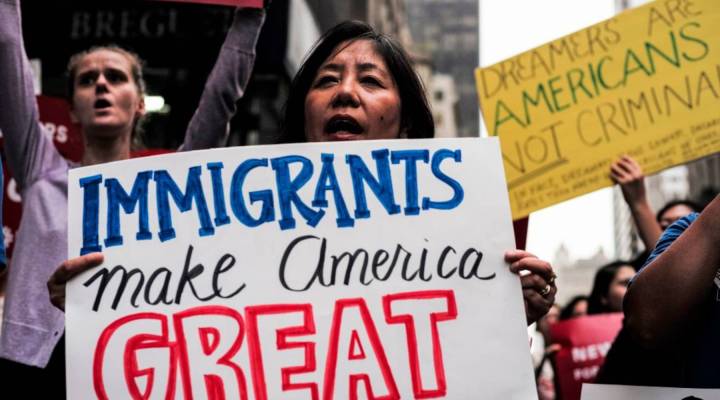
As immigration deal stalls, "Dreamer" business owners deal with uncertainty
As immigration deal stalls, "Dreamer" business owners deal with uncertainty

Mostafa Ghonim used to read the news every day, hoping to see Congress reach a compromise on immigration reform. But as he saw failed deals, veto threats and stalemates triggering two government shutdowns, even the act of reading the news became too emotionally taxing.
Ghonim is one of the nearly 700,000 Deferred Action for Childhood Arrivals recipients, or dreamers, who have been stuck in limbo as Congress and the White House struggle to come to an agreement on immigration reform.
Back in 2012, President Barack Obama established the program allowing undocumented immigrants who were brought here as children and who met certain requirements to get relief from deportation. They could also obtain work permits that had to be renewed every two years.
Last September, President Donald Trump issued a directive overturning Obama’s order, giving Congress until March 5 to come up with another solution before the DACA program was phased out. Two federal judges have issued injunctions requiring the Trump administration to keep DACA in place, and this week, the Supreme Court declined a request by the White House to rule on this issue, allowing the current cases to work their way through the appeals court.
Once the program officially ends, as many as 1,400 DACA recipients could lose their protected status each day, according to Nicholas G. Garaufis, the federal judge in Brooklyn who issued the second injunction. He went on to point out that employers would also suffer as DACA recipients’ job permits expired and they could no longer work. This, he argued, would have “staggering adverse economic impacts,” including up to $800 million in lost tax revenue.
That lost revenue would come from people like Ghonim. Now 27, he moved to the U.S. from Egypt when he was just 7 years old. Losing his work permit would also mean losing his catering business, which he runs from a co-working space in Queens. It would also mean that the 20 to 30 people who work for him would also lose their jobs — something that Ghonim discussed with his employees last fall shortly after Trump’s decision to overturn DACA.
“I explained to them what the situation was, and to my surprise, a lot of them kind of walked away with a shock in their spirit because they were thinking that ‘Wow, I had no idea because I see you as one of us,’” he said. “If the program doesn’t affect you or anyone in your family, you’re not exactly concerned what this is about. But once you see that it’s someone close to you, you’re looking at it in a completely different light.”

Mostafa Ghonim, who runs a catering business, says once you know someone who is affected by DACA, you look at it in a different light.
Ghonim’s permit is set to expire in September of next year. However, applications for renewal can only be filed within a three-to-five month window before the expiration date. That means Ghonim can do nothing but wait and see if the program is still around this time next year.
Thousands of other business owners and job creators find themselves in a similar situation. According to a Center for American Progress survey of 3,063 DACA recipients in 46 states, about 5 percent of them started their own businesses. For the American public in general, that number is 3.1 percent.
This wait-and-see stalemate makes running a business and planning ahead “very difficult,” Ghonim said. Having grown up as an undocumented immigrant of Muslim descent, he is used to living in fear. Fear of possible deportation if and when DACA is revoked affects his everyday decisions.
“It even comes down to the point where I’m considering how much money I leave in the bank, because at any moment you can get a notice or something happens to your family,” he said. “You are concerned that literally everything that you’ve ever built can be taken away.”
| As immigration deadline looms, DACA recipients and employers find themselves in a difficult situation |
| Some immigrants returning to Mexico find new opportunities |
There’s a lot happening in the world. Through it all, Marketplace is here for you.
You rely on Marketplace to break down the world’s events and tell you how it affects you in a fact-based, approachable way. We rely on your financial support to keep making that possible.
Your donation today powers the independent journalism that you rely on. For just $5/month, you can help sustain Marketplace so we can keep reporting on the things that matter to you.


















